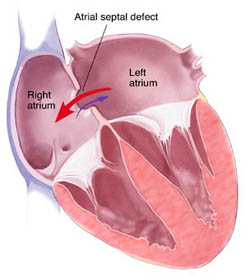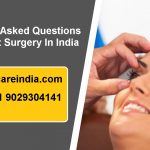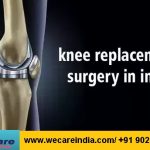ASD Surgery In India

An atrial septal defect is an abnormal opening in the wall (septum) that divides the two upper chambers of the heart (atria). The atrial septal defect closure procedure corrects this abnormal opening.
If your child has an atrial septal defect, your doctor may recommend monitoring it for a period of time to see if it closes on its own, while treating any symptoms with medications. Many atrial septal defects close on their own during childhood. For those that don’t close, some small atrial septal defects don’t cause any problems and may not require any intervention. But, many atrial septal defects eventually require surgery to be corrected.
If your child needs treatment, the timing of it depends on your child’s condition and whether your child has any other congenital heart defects.
There are three major types of atrial septal defects : –
Secundum Atrial Septal Defect : – This is the most common atrial septal defect. It is caused when a part of the atrial septum fails to close completely while the heart is developing. This causes an opening to develop between the atria.
Primum Atrial Septal Defect : – This defect is part of the AV canals, and is often found at a split in the leaflet of the valve.
Sinus Venosus Atrial Septal Defect : – This defect occurs at the superior vena cava and right atrium juncture. In this defect, one or more of the pulmonary veins enter the right atrium instead of correctly entering the left atrium.
<Individuals with ASD are at an increased risk for developing a number of complications including : –
- Atrial fibrillation (in adults)
- Heart failure
- Pulmonary overcirculation
- Pulmonary hypertension
- Stroke
Medications in India
Medications won’t repair the hole, but they may be used to reduce some of the signs and symptoms that can accompany an atrial septal defect. Drugs may also be used to reduce the risk of complications after surgery.
Medications may include those to : –
- Keep the heartbeat regular : – Examples include beta blockers (Lopressor, Inderal) and digoxin (Lanoxin).
- Reduce the risk of blood clots : – Anticoagulants, often called blood thinners, can help reduce the chances of developing a blood clot and having a stroke. Anticoagulants include warfarin (Coumadin) and anti-platelet agents, such as aspirin.
- Signs And Tests : – The doctor may heart abnormal heart sounds when listening to the chest with a stethoscope. A murmur may be heard only in certain body positions, and sometimes a murmur may not be heard at all. The physical exam may also reveal signs of heart failure in some adults. If the shunt is large, increased blood flow across the tricuspid valve may create an additional murmur when the heart relaxes between beats.
- Causes of Atrial Septal Defect (ASD) : – Doctors know that heart defects present at birth (congenital) arise from errors early in the heart’s development, but there’s often no clear cause. Genetics and environmental factors may play a role.ASDs are a common type of congenital heart disease, though their precise incidence is not well understood. An isolated ASD may present at any age, since the resulting murmur is often overlooked. In children with congenital heart disease, it is estimated that as many as 33-50% will have an associated ASD as part of their complex of disease.
Signs or symptoms in India : –
- Poor appetite
- Failure to gain weight (infants)
- Bluish discoloration of the skin
- Shortness of breath
- Easy tiring
- Swelling of legs, feet or abdomen
- Heart palpitations or skipped beats
- Fatigue
- Sweating
- Rapid breathing
- Shortness of breath
- Poor growth in children
- Difficulty breathing (dyspnea)
- Frequent respiratory infections in children
- Sensation of feeling the heart beat (palpitations) in adults
- Shortness of breath with activity








